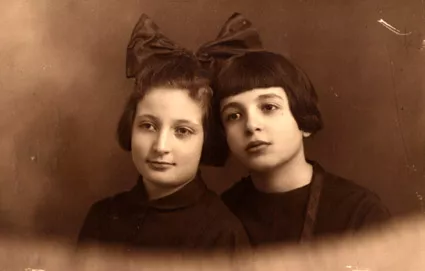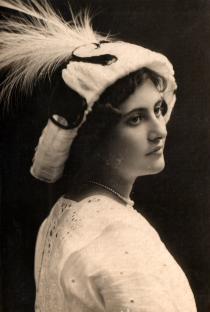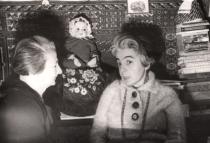Tamara Goldenberg, with her cousin Renata Geftman
This is me with my cousin Renata Geftman.
The picture was taken in Paris 1926.
I was born in Sevastopol in 1917. My true name is Tamara -Alexandrà. I was named Tamara at birth. My mother's brother Alexander Geftman tragically perished in 1918 shortly after my birth.
After that tragedy I was given a double name Tamara - Alexandrà, and this is my original name, written in the documents. People call me Tamara.
In 1917 my maternal grandfather Pincus Geftman immigrated with his family. All Geftmans left, but my mother. My relatives did not approve of revolution. First they went to Constantinople.
Then they had a skimpy living wandering from one country to another. In the end they all happened to be in France. The entire family got together in Paris. They were not well-off, but could abide by their living.
There were a lot of them and they helped each other. I did not have blood brothers or sisters, but I had a lot of cousins in Russia and France. I loved them as my brothers and sisters. They all emigrated from Russia in childhood, but they kept in touch with mother and me.
Grandfather Pincus loved mother very much, and yearned for her when he was in Paris. Uncle Joseph always wrote to us in Sevastopol on behalf of grandpa. Then he got real unwell.
Then mother decided to say good-bye to him. I do not know how she managed to get a permit for the trip. May at that time rules were not strict.
So we went to Paris in 1925. We lived in France for a year and a half, and then grandfather died. I went to school in Paris and made friends with my cousin Renata Geftman.
My relatives rented a two-storied cottage in decent Paris district, though not in the most fashionable. There were a lot of rooms.
Grigoriy and her family lived in that house, as well as grandparents, aunt Maria with her daughter. Joseph and Konstantin lived separately.
Our family was very friendly and rather religious. We celebrated all Jewish religious holidays. I was deeply impressed by celebration of Pesach. We put out special dishes. We washed and changed our dresses. All relatives came in dressed up. There was a festive air in the house.
Grandmother did not cook, as she was very old. She stayed at the corner knitting and making clothes to our dolls. Aunt Nadezhda, Grigoriy's wife cooked everything .I remember delicious gefilte fish, potato patties .
Aunt Nadezhda, my mother and aunt Maria baked strudels from matzah flour, stuffed with jam, raisons and nuts. We observed all rites and traditions of paschal holidays. Before Pesach we cleaned the house and put out different dishes.
We took the furniture from the apartment, scourged the things and washed walls. There was not a single bread crumb in the house.
They bought a lot of matzah for the entrire Pascal period.
Bread was not eaten for 8 days. Uncles went to the synagogue.
On the first paschal night grandfather held Seder lying on the pillows [According to the Jewish tradition the eldest man in the family, the one who made Seder, was supposed to recline on the soft (usually pillows were used for that), which was the embodiment of relaxation and exemption from slavery].
He broke matzah into three pieces and hid the middle part in the pillows. Someone from the children had to steal it and hide away, and then give it to the grandfather for the ransom. [editor's note: had to find the hidden piece] I was the one who was supposed to snitch that matzah.
Uncle Joseph read Haggadah in Ivrit, then brother Leonid asked him the traditional four questions in Ivrit. After that grandmother read a prayer and we all sang mirthful paschal songs. We did not observe Jewish rites at home, that is why I enjoyed seeing all those interesting things here.
Before we left for France with my mother, father asked his uncle Michel to have my tonsils removed. I was afflicted with quinsy annually. I was operated on in the clinic where my uncle worked. The operation was not complicated, but I was about to die from sever blood loss.
Grandfather died in 1926. He was buried in Paris on the Jewish cemetery, with all rites and traditions having been observed.
Soon we came back to Sevastopol


































